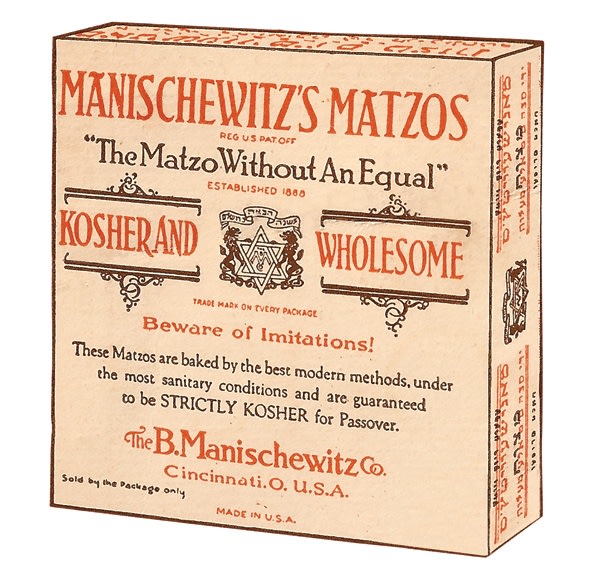
Most dishes we think of as “Jewish food” are delicious borrowings from whatever country our ancestors happened to find themselves in, but one of the very few foods that Jews actually did invent is matzah, the unleavened cakes the Hebrew slaves ate in their haste to depart Egypt. Today strict rabbinical rules govern every aspect of its production.
“Our process with our Passover matzah,” explained David Rossi, vice-president of marketing for RAB Food Group, owners of the Manischewitz brand, “from the time water touches the flour and gets mixed, then sheeted, made thinner and thinner, to the end of baking in the oven – can be no longer than 18 minutes. If there is a mechanical failure or some issue or error where the matzah did not get through that run in 18 minutes, then the whole run must be thrown away.”
Before the company can begin production for Passover, the entire facility must be thoroughly cleaned and inspected – a procedure that makes my grandmother’s yearly white glove test routine seem like a light dusting.
“The process takes four to seven weeks,” Rossi noted. “All the belts, all the lines, all the motors, all the ovens are cleaned and kashered to meet strict rabbinical standards for Passover.”
Turning out hundreds of Passover items, in addition to 10 varieties of matzah is no overnighter. “We begin making Passover products in September until early March for the following year,” Rossi noted. “Because the plant is kashered at tremendous expense, we produce Passover products until we’ve run all the requirements for the year. Then in March we start making non-Passover products.”
During the Seder we call matzah the “bread of affliction,” but that misses the real point of the holiday. Most of all Passover is the story of freedom. In retelling the Passover story, each of us relives the exodus as if we ourselves were there. To focus on what we do without for those eight days is to see the glass half empty.
Yes, we eat matzah, the poor bread that sustained our ancestors in the desert, but because we were liberated, we are free to use our ingenuity, skill, traditions and collective memory to create a glorious celebration around it.
Challenge breeds creativity, and imaginative Jewish cooks through the ages, like a million Iron Chefs all working with the same surprise ingredient, have molded, crumbled, whipped, layered, fried, baked, infused and combined matzah and its ground cousins with an astonishing variety of other ingredients to produce a tempting feast. The fact that we base a banquet on the “bread of affliction” illustrates that we have the freedom to do so.
During the Seder, we eat matzah with haroset, the fruit and nut mixture resembling the mortar the ancient Hebrews used as slaves in Egypt. Ground matzah, known as matzah meal, combines with eggs and oil to produce the feathery soup dumplings every Jewish mama’s cooking is known for: matzah balls.
Any lingering thoughts on the restrictions of Passover are quickly dispelled by dessert. Matzah ground even finer into matzah cake meal underpins the stunning display to bring a sweet end to our sweet celebration of freedom.
When I’m looking for Passover dessert recipes, I always return to Penny Eisenberg’s classic cookbook “Passover Desserts” (Wiley). Now the book has been updated and revised in CD form, available on amazon as well as through Eisenberg’s website.
With 50 new drawings and photos attached to the recipes, you’ll salivate over Fudgy Nut-Butter Torte; Linzer Tarts; Hazelnut, Pear and Raspberry Torte; Hazelnut Sandwich Cookies; White Chocolate Mousse Cake and Browned Butter Strawberry Tart.
Some Orthodox communities observe the custom of not eating matzah or matzah meal that has been moistened with water or other liquid (known as gebrokts), to avoid the possibility of leavening. A new cookbook from Tamar Ansh, “Pesach – Anything’s Possible!” (Targum Press) offers over 350 non-gebrochts, gluten-free and wheat-free recipes with mouth-watering photos and dozens of tips and helpful hints for the holiday.
Caramelized Onion Chicken, Sweet Potato Apple Tzimmes Kugel, Pepper Short Ribs, Cinnamon Pumpkin Soup, Minted Carrot and Fennel Salad, White Coconut Chiffon Cake – too bad Passover lasts only eight days! Chag sameach!

Judy Bart Kancigor is the author of “Cooking Jewish: 532 Great Recipes from the Rabinowitz Family” and can be found on the web at www.cookingjewish.com.
The words of this author reflect his/her own opinions and do not necessarily represent the official position of the Orthodox Union.

